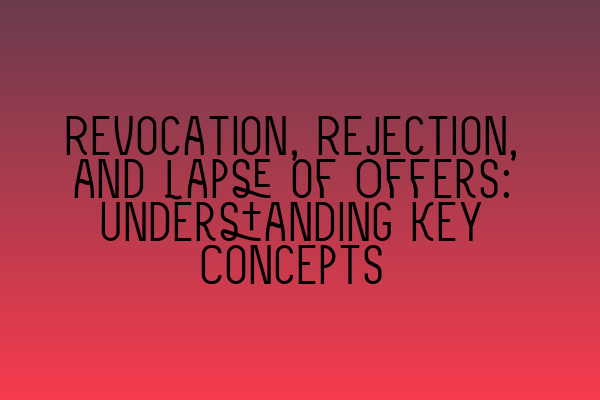Revocation, Rejection, and Lapse of Offers: Understanding Key Concepts
In contract law, offers play a crucial role in forming a legally binding agreement between parties. However, it is important to understand the concepts of revocation, rejection, and lapse of offers to ensure clarity and avoid any potential disputes. In this article, we will delve into these key concepts and explore their implications.
Revocation of Offers
Revocation refers to the act of withdrawing or canceling an offer before it is accepted. It is important to note that an offer can be revoked at any time before it is accepted, as long as the revocation is communicated effectively to the offeree. The revocation must be communicated directly to the offeree or through a reliable third party, and the offeree must have knowledge of the revocation to render it effective.
To better understand revocation, consider the following scenario: A offers to sell a car to B for a specified price. However, before B accepts the offer, A decides to sell the car to C instead. A must communicate the revocation of the offer to B before B accepts the offer.
It is important to note that revocation is not effective if the offeree is not aware of it. Therefore, if B is not aware that A has sold the car to C, and B communicates acceptance of the offer to A, a valid contract is formed between A and B.
Rejection of Offers
Rejection occurs when the offeree explicitly refuses to accept an offer. Once an offer has been rejected, it becomes null and void, and the offeree cannot later accept it. It is crucial for the rejection to be communicated to the offeror for it to be effective.
For example, if A offers to sell a car to B, and B responds by saying, “I do not want to buy your car,” it constitutes a clear rejection of the offer. A cannot later insist on B accepting the offer.
However, it is important to distinguish between a rejection and a counteroffer. A counteroffer is a response to the original offer that proposes different terms. In such cases, the original offer is terminated, and a new offer is made. If the original offeror accepts the counteroffer, a contract is formed based on the new terms.
Lapse of Offers
An offer can also lapse if certain conditions are met. There are three common ways in which an offer can lapse:
- Expiration of Time: If an offer specifies a time limit for acceptance, the offer lapses if the offeree does not accept within that timeframe. It is important for the offeror to clearly communicate the duration of the offer.
- Death or Incapacity: If either the offeror or the offeree dies or becomes incapacitated before acceptance, the offer is automatically terminated.
- Failure to Fulfill Conditions: If an offer is made subject to certain conditions, such as obtaining financing or regulatory approval, the offer lapses if those conditions are not fulfilled within a reasonable time.
Understanding these concepts of revocation, rejection, and lapse of offers is essential in contract law. It helps ensure that parties involved have a clear understanding of their rights and obligations when entering into an agreement. By familiarizing oneself with these principles, one can navigate contract negotiations with confidence.
For more insights into contract law and related topics, we recommend reading the following articles:
- Interpreting Contractual Clauses: Unlocking the Hidden Meanings
- Contract Law Tutorials: Simplifying Complex Concepts for Students
- Discharge of Contracts: Modes and Consequences Explained
- Exploring Third Party Rights in Contract Law: Implications and Boundaries
- Contractual Obligations: Navigating the Responsibilities of Parties
By expanding your knowledge in these areas, you will have a comprehensive understanding of contract law and be better equipped to handle legal complexities in your professional or academic pursuits.
